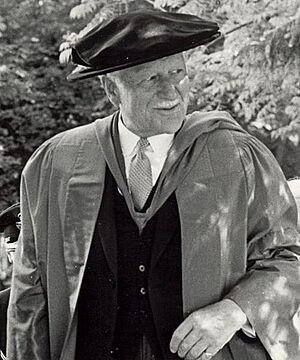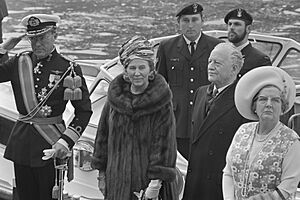Roland Michener facts for kids
Quick facts for kids
Roland Michener
|
|
|---|---|

Michener in 1972
|
|
| 20th Governor General of Canada | |
| In office April 17, 1967 – January 14, 1974 |
|
| Monarch | Elizabeth II |
| Prime Minister | Lester B. Pearson Pierre Trudeau |
| Preceded by | Georges Vanier |
| Succeeded by | Jules Léger |
| 24th Speaker of the House of Commons of Canada | |
| In office October 14, 1957 – September 26, 1962 |
|
| Monarch | Elizabeth II |
| Governor General | Vincent Massey Georges Vanier |
| Prime Minister | John Diefenbaker |
| Preceded by | Louis-René Beaudoin |
| Succeeded by | Marcel Lambert |
| More... | |
| Personal details | |
| Born |
Daniel Roland Michener
April 19, 1900 Lacombe, Northwest Territories, Canada (now Lacombe, Alberta) |
| Died | August 6, 1991 (aged 91) Toronto, Ontario, Canada |
| Spouse | Norah Michener |
| Alma mater | University of Alberta (BA) Hertford College, Oxford (MA, BCL) |
| Profession | Lawyer, Politician, Diplomat |
| Signature | |
Daniel Roland Michener (April 19, 1900 – August 6, 1991) was a Canadian lawyer, politician, and diplomat. He served as the Governor General of Canada, which is the Queen's representative in Canada. He was the 20th person to hold this important role since Canada became a country.
Michener was born and went to school in Alberta. He even studied at the University of Oxford in England. After becoming a lawyer, he entered politics. He was elected to the House of Commons of Canada in 1957. There, he became the Speaker, a job he held until 1962. Later, he worked as a diplomat, representing Canada in other countries from 1964 to 1967.
In 1967, Queen Elizabeth II appointed him Governor General. This happened after the Prime Minister, Lester B. Pearson, suggested him for the role. Michener was known as a popular Governor General. Many people believe his time in office was a very important period for the role of Governor General in Canada.
Contents
Early Life and Education
Roland Michener was born in Lacombe, Alberta, which was then part of the Northwest Territories. His father, Edward Michener, was a Senator. Roland went to the University of Alberta. There, he earned a Bachelor of Arts degree. He also won a special scholarship called a Rhodes Scholarship. This scholarship allowed him to study at Hertford College at the University of Oxford in England.
While at Oxford, he played for the university's ice hockey team. He also became good friends with Lester B. Pearson, who would later become Prime Minister of Canada. After finishing his studies, Michener returned to Canada. He settled in Toronto and started working as a lawyer. He also helped manage the Rhodes Scholarship program in Canada for many years.
In 1927, Roland Michener married Norah Willis. They had three daughters together.
Political Career and Public Service
Michener first tried to become a politician in Ontario in 1943. He ran for the Progressive Conservative Party of Ontario, but he lost that election. He tried again in 1945 and won. After winning, he became a minister in the provincial government. He was responsible for making government meetings more organized. In 1948, he lost his seat in the provincial election.
After that, Michener decided to try for federal politics. He ran for a seat in the House of Commons of Canada in 1949 but was not successful. In 1953, he tried again and was elected as a Member of Parliament.
In 1957, the Progressive Conservative party formed a government. Michener was chosen to be the Speaker of the House of Commons. The Speaker is like a referee in Parliament. They make sure debates are fair and follow the rules. As Speaker, Michener was known for letting the opposition parties speak freely. This sometimes made the Prime Minister, John Diefenbaker, unhappy. Many people were impressed by Michener's fair approach.
In 1962, Michener ran for re-election but lost his seat. This was unusual because his party still formed the government. After this, he went back to working as a lawyer.
In 1963, his old friend, Lester Pearson, became Prime Minister. A year later, Pearson asked Michener to become Canada's High Commissioner to India. This is a top diplomat role. Six months later, Michener also became Canada's first ambassador to Nepal. While he was serving in these roles, the Prime Minister told him he was being considered for the job of Governor General.
Governor General of Canada
On March 29, 1967, Queen Elizabeth II officially appointed Roland Michener as the Governor General. He was sworn into office on April 17, 1967. Even though he was from a different political party, many Liberal politicians welcomed his appointment. They felt he was the best person for the job.
Just ten days after becoming Governor General, Michener helped open Expo 67 in Montreal. This was a huge world's fair held to celebrate Canada's 100th birthday. Many leaders and important people from around the world visited. As the Queen's representative, Michener greeted all of them. These guests included the President of the United States, Lyndon B. Johnson, and the President of France, Charles de Gaulle. When President de Gaulle visited Montreal, he famously shouted "Vive le Québec libre" ("Long live free Quebec"). The crowd cheered for de Gaulle but booed Michener when the Royal Anthem was played.
Less than a year into his term, Michener faced a difficult situation. The government of Prime Minister Pearson was unexpectedly defeated on a tax bill. Michener had to decide if the Prime Minister needed to resign or call an election. After getting a lot of advice, Michener decided that Pearson only had to resign if Parliament passed a clear "no confidence" vote. This vote did not pass, but an election was still held later that year.
In October 1970, a group called the Front de libération du Québec (FLQ) kidnapped two important people in Quebec. This event became known as the October Crisis. It was later revealed that the FLQ had originally planned to kidnap Michener himself. During this crisis, Michener, acting on the government's advice, used the War Measures Act. This law allowed police and the military to arrest many people and helped end the kidnappings.
On July 1, 1967, the Order of Canada was created. This is a very high honour for Canadians. Michener became the first member of this order. He also became its first leader and held the first award ceremony at Rideau Hall. In 1972, the Order of Military Merit was also created, and Michener became its first leader too.

In 1971, Michener made history by making a state visit to Trinidad and Tobago. While other Governors General had traveled abroad, this was the first time a Canadian Governor General made an official state visit as the representative of Canada's head of state. This trip was very successful and set a new example for future Governors General.
Michener's Legacy
Michener made some changes to the traditions of the Governor General's office. For example, he stopped the practice of women having to curtsey (bow) to the Governor General. He also started holding regular meetings with the lieutenant-governors of the provinces. This helped to strengthen the connections between his office and the provincial representatives.
Michener also created two important awards for Canadians. Because he loved fishing, he started the Michener Tuna Trophy. He also created the Michener Award for Journalism in 1970. This award recognizes excellent journalism in Canada. For his great service, Queen Elizabeth II gave him the Royal Victorian Chain. This is a very special personal gift from the monarch.
Retirement and Later Life
After his time as Governor General ended in 1974, Roland Michener and his wife moved back to Toronto. He remained very active, serving on company boards and supporting Canadian charities and cultural groups. From 1973 to 1980, he was the leader of Queen's University.
He also encouraged physical activity for young people and seniors. To show his commitment, at the age of 80, he climbed to the top of Mount Michener in Alberta. This mountain had been named after him. In 1990, he also allowed his name to be used by the Michener Institute, a school for health sciences.
In the mid-1980s, Michener cared for his wife, Norah, who was ill. She passed away in 1987. Roland Michener died on August 6, 1991. Their ashes are buried in St. Bartholomew's Anglican Church in Ottawa, which is very close to Rideau Hall, where he once lived as Governor General.
Honours and Awards
Roland Michener received many honours and awards throughout his life for his service to Canada.
- Member of the Queen's Privy Council for Canada (PC)
- Knight of Justice of the Most Venerable Order of the Hospital of Saint John of Jerusalem (KStJ)
- Chief Scout of Canada
- Chancellor and Principal Companion of the Order of Canada (CC)
- Chancellor and Commander of the Order of Military Merit (CMM)
- Honorary Fellow of the Royal Heraldry Society of Canada (FRHSC(hon))
- Member of the Order of Ontario (OOnt)
He also received several medals, including:
- King George VI Coronation Medal (1937)
- Queen Elizabeth II Coronation Medal (1953)
- Canadian Forces' Decoration (CD) (1967)
- Canadian Centennial Medal (1967)
- Queen Elizabeth II Silver Jubilee Medal (1977)
- Commemorative Medal of the 2500th Anniversary of the founding of the Persian Empire (1971)
In 1973, he received the Royal Victorian Chain, a special gift from Queen Elizabeth II.
Things Named After Roland Michener
Many things have been named in honour of Roland Michener, including:
- Awards: The Michener Award for Journalism and the Roland Michener Trophy.
- Organizations: The Michener Awards Foundation and The Michener Institute.
- Places: Mount Michener in Alberta, and streets in cities like Regina, Saskatoon, and Mount Pearl.
- Buildings: The Roland Michener Arena in Transcona, Winnipeg.
- Schools: Several schools across Canada, including Roland Michener Elementary in Calgary and Roland Michener Secondary School in Timmins.
Images for kids
See also
 | Ernest Everett Just |
 | Mary Jackson |
 | Emmett Chappelle |
 | Marie Maynard Daly |


